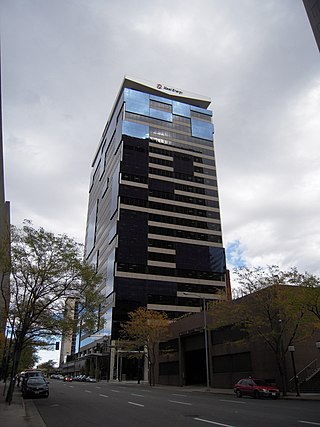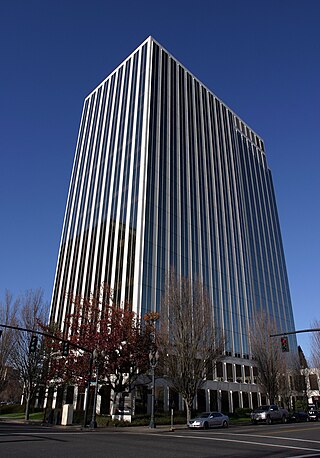Related Research Articles
Southern Company is an American gas and electric utility holding company based in the Southern United States. It is headquartered in Atlanta, Georgia, with executive offices also located in Birmingham, Alabama. The company is the second largest utility company in the U.S. in terms of customer base, as of 2021. Through its subsidiaries it serves 9 million gas and electric utility customers in 6 states. Southern Company's regulated regional electric utilities serve a 120,000-square-mile (310,000 km2) territory with 27,000 miles (43,000 km) of distribution lines.

The Potomac Electric Power Company (PEPCO) is an American utility company that supplies electric power to the city of Washington, D.C., and to surrounding communities in Maryland. It is owned by Exelon.
Eversource Energy is a publicly traded, Fortune 500 energy company headquartered in Hartford, Connecticut, and Boston, Massachusetts, with several regulated subsidiaries offering retail electricity, natural gas service and water service to approximately 4 million customers in Connecticut, Massachusetts, and New Hampshire.

Emera Incorporated is a publicly traded Canadian multinational energy holding company based in Halifax, Nova Scotia. Created in 1998 during the privatization of Nova Scotia Power, a provincial Crown corporation, Emera now invests in regulated electricity generation as well as transmission and distribution across North America and the Caribbean.
Fortis Inc. is a St. John's, Newfoundland and Labrador-based international diversified electric utility holding company. It operates in Canada, the United States, Central America, and the Caribbean. In 2015, it earned CA$6.7 billion.

Xcel Energy Inc. is a U.S. regulated electric utility and natural gas delivery company based in Minneapolis, Minnesota, serving more than 3.7 million electric customers and 2.1 million natural gas customers across parts of eight states. It consists of four operating subsidiaries: Northern States Power-Minnesota, Northern States Power-Wisconsin, Public Service Company of Colorado, and Southwestern Public Service Co.

Florida Power & Light Company (FPL), the principal subsidiary of NextEra Energy Inc., is the largest power utility in Florida. It is a Juno Beach, Florida-based power utility company serving roughly 5 million customers and 11 million people in Florida. It is a rate-regulated electric utility that generates, transmits, distributes and sells electric energy. In 2020, the company was ranked as the nation's most reliable electric power utility for the fifth time in six years.

Constellation Energy Corporation is an American energy company headquartered in Baltimore, Maryland. The company provides electric power, natural gas, and energy management services. It has approximately two million customers across the continental United States.

Aquila, Inc. was an electricity and natural gas distribution network headquartered in Kansas City, Missouri in the United States. The company also owned and operated power generation assets. It previously operated under the name UtiliCorp United, Inc. The company at one time ranked #33 on the Fortune 500 list.

DTE Energy is a Detroit-based diversified energy company involved in the development and management of energy-related businesses and services in the United States and Canada. Its operating units include an electric utility serving 2.2 million customers and a natural gas utility serving 1.3 million customers in Michigan.
SCANA Corporation was an American regulated electric and natural gas public utility. The company was based in Cayce, South Carolina, a suburb of Columbia, South Carolina. Following the Nukegate scandal, the company's stock fell and the company was in disrepair. In January 2019, SCANA was acquired by Dominion Energy. The corporate name SCANA was not an acronym, but was taken from the letters in South Carolina.

PacifiCorp is an electric power company in the western United States.
Idaho Power Company (IPC) is a regulated electrical power utility. Its business involves the purchase, sale, generation, transmission and distribution of electricity in eastern Oregon and southern Idaho. It is a subsidiary of IDACORP, Inc. The company's 24,000-square-mile (62,000 km2) service area generally follows the area around the Snake River and its tributaries.
Madison Gas and Electric Company (MGE) is the primary subsidiary of MGE Energy, Inc.. As a regulated utility, it primarily serves the Madison, Wisconsin metropolitan area with electricity, gas and green energy options.

PECO, formerly the Philadelphia Electric Company, is an energy company founded in 1881 and incorporated in 1929. It became part of Exelon Corporation in 2000 when it merged with Commonwealth Edison's holding company Unicom Corp.

Solar power in Arizona has the potential to, according to then-Governor Janet Napolitano, make Arizona "the Persian Gulf of solar energy". In 2012, Arizona had 1,106 MW of photovoltaic (PV) solar power systems, and 6 MW of concentrated solar power (CSP), bringing the total to over 1,112 megawatts (MW) of solar power. As an example, the Solana Generating Station, a 280 MW parabolic trough solar plant, when commissioned in 2013, was the largest parabolic trough plant in the world and the first U.S. solar plant with molten salt thermal energy storage.
Algonquin Power & Utilities Corp. is a Canadian renewable energy and regulated utility conglomerate with assets across North America. Algonquin actively invests in hydroelectric, wind and solar power facilities, and utility businesses, through its three operating subsidiaries: Bermuda Electric Light Company, Liberty Power and Liberty Utilities.
Net metering in Arizona is a public policy and political issue regarding the rates that Arizona utility companies pay solar customers sell excess energy back to the electrical grid. The issue has two political sides: utility companies that to pay solar customers the "wholesale rate" for their excess electricity, and solar panel installers and solar customers who want utility companies to pay the "retail rate".

The Electric Bond and Share Company (Ebasco) was a United States electric utility holding company organized by General Electric. It was forced to divest its holding companies and reorganize due to the passage of the Public Utility Holding Company Act of 1935. Following the passage of the Act, the U.S. Securities and Exchange Commission (SEC) selected the largest of the U.S. holding companies, Ebasco to be the test case of the law before the U.S. Supreme Court. The court case known as Securities and Exchange Commission v. Electric Bond and Share company was settled in favor of the SEC on March 28, 1938. It took twenty-five years of legal action by the SEC to break up Ebasco and the other major U.S. electric holding companies until they conformed with the 1935 act. It was allowed to retain control of its foreign electric power holding company known as the American & Foreign Power Company (A&FP). After its reorganization, it became an investment company, but soon turned into a major designer and engineer of both fossil fuel and nuclear power electric generation facilities. Its involvement in the 1983 financial collapse of the Washington Public Power Supply System's five nuclear reactors led to Ebasco's demise because of the suspension of nuclear power orders and lawsuits that included numerous asbestos claims. The U.S. nuclear industry stopped all construction of new facilities following the 1979 nuclear meltdown at Three Mile Island, going into decline because of radiation safety concerns and major construction cost overruns.
References
- ↑ Gelles, David (December 11, 2013). "Canadian Utility Buys UNS Energy of Arizona for $2.5 Billion". DealBook.
- 1 2 Leighton, David (June 29, 2015). "Street Smarts: Meet the man who helped light up Tucson". Arizona Daily Star . Retrieved April 25, 2024.
- 1 2 "Tucson Electric Power Company collection" (PDF).
- ↑ Brown's Directory of American Gas Companies ...: Statistics of Gas Companies in the United States and Canada, ... 1907. p. 270 – via Google Books.
- ↑ "ELECTRIC CONCERNS MERGE.; Eleven Properties in Six Western States Consolidate". The New York Times. 1910-06-10. ISSN 0362-4331 . Retrieved 2021-11-21.
- ↑ "CITIES SERVICE GETS FEDERAL LIGHT CO.; Control of $54,000,000 Concern Is Obtained by $1,000,000,000 Doherty Firm.22 SUBSIDIARIES INVOLVED Operate in Missouri, New Mexico, Colorado, Arkansas, Washington and New Brunswick". The New York Times. 1930-03-13. ISSN 0362-4331 . Retrieved 2021-11-21.
- ↑ Gheorghiu, Iulia (2018-08-22). "Tucson Electric proceeding lays groundwork for customer solar+storage rate". Utility Dive. Retrieved 2018-08-30.